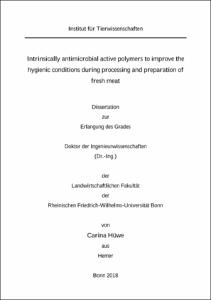Hüwe, Carina: Intrinsically antimicrobial active polymers to improve the hygienic conditions during processing and preparation of fresh meat. - Bonn, 2018. - Dissertation, Rheinische Friedrich-Wilhelms-Universität Bonn.
Online-Ausgabe in bonndoc: https://nbn-resolving.org/urn:nbn:de:hbz:5n-52948
Online-Ausgabe in bonndoc: https://nbn-resolving.org/urn:nbn:de:hbz:5n-52948
@phdthesis{handle:20.500.11811/7387,
urn: https://nbn-resolving.org/urn:nbn:de:hbz:5n-52948,
author = {{Carina Hüwe}},
title = {Intrinsically antimicrobial active polymers to improve the hygienic conditions during processing and preparation of fresh meat},
school = {Rheinische Friedrich-Wilhelms-Universität Bonn},
year = 2018,
month = dec,
note = {The objective of this thesis was the investigation of the potential of intrinsically antimicrobial active polymers to improve the hygienic conditions in all steps of the processing and preparation of fresh meat, from the food industry to the domestic kitchen.
The antimicrobial activity of the homopolymer poly(TBAMS) and the copolymer poly (TBAMS:acrylonitrile) [1:1] was screened against pathogenic and spoilage bacteria present on meat processing and preparation equipment. Further, the influence of conditions typical during the processing and preparation of fresh meat on the activity was analyzed. For these aspects, 837 samples containing poly(TBAMS) and 1587 references were investigated. To analyze the long-term activity 646 samples of three poly(TBAMS) containing materials (poly(TBAMS), poly(TBAMS:acrylonitrile), poly(TBAMS:4-vinylpyridine) were stored under three environmental conditions over a period of three years. The antimicrobial activity was screened at fixed intervals and the long-term activity of the polymers was modelled. Also, the activity of poly(TBAMS) incorporated into LLDPE was determined and compared via antimicrobial screening of two other antimicrobially treated boards (poly(TBAEMA), Microban®). In three different scenarios typical during the preparation of meals in domestic kitchens, the effect on the transfer of pathogens between the cutting boards and food was compared between cutting boards with poly(TBAMS) and untreated material. The ability of the new polymer to reduce the colonization of surfaces was examined via comparing biofilms on 200 samples as well as references. Based on the overall results, the potential of intrinsically antimicrobial active materials to improve the hygienic conditions during the processing and preparation of fresh meat was assessed.
The antimicrobial screenings showed the general potential of poly(TBAMS)-containing materials to improve the hygienic condition in the food chain. Good antimicrobial activity was proven against various bacteria. The activity was decreased marginally over a period of three years. Screenings identified different environmental and processing factors influencing the activity, which was differently pronounced for the individual bacteria strains. Thus, no effect on the activity against L. monocytogenes was proven while the effect against P. fluorescens was evident. However, a retarding effect, e.g. of lowering temperature, could be counteracted by prolonging the contact time. The LLDPE-board with 10 % poly (TBAMS) showed, in comparison to other antimicrobial treated polymeric boards, the greatest antimicrobial profile. However, the effect on cross-contamination of pathogenic bacteria was limited. Still, the same material suppressed or delayed respectively the formation of biofilms. Considering all results, the application of poly(TBAMS) in food contact materials bears the potential to improve the hygienic conditions during the processing and preparation of fresh meat, especially via affecting the persistence of bacteria on surfaces. For an effective application of poly(TBAMS) as food contact material further developments and legitimate validation is necessary.},
url = {https://hdl.handle.net/20.500.11811/7387}
}
urn: https://nbn-resolving.org/urn:nbn:de:hbz:5n-52948,
author = {{Carina Hüwe}},
title = {Intrinsically antimicrobial active polymers to improve the hygienic conditions during processing and preparation of fresh meat},
school = {Rheinische Friedrich-Wilhelms-Universität Bonn},
year = 2018,
month = dec,
note = {The objective of this thesis was the investigation of the potential of intrinsically antimicrobial active polymers to improve the hygienic conditions in all steps of the processing and preparation of fresh meat, from the food industry to the domestic kitchen.
The antimicrobial activity of the homopolymer poly(TBAMS) and the copolymer poly (TBAMS:acrylonitrile) [1:1] was screened against pathogenic and spoilage bacteria present on meat processing and preparation equipment. Further, the influence of conditions typical during the processing and preparation of fresh meat on the activity was analyzed. For these aspects, 837 samples containing poly(TBAMS) and 1587 references were investigated. To analyze the long-term activity 646 samples of three poly(TBAMS) containing materials (poly(TBAMS), poly(TBAMS:acrylonitrile), poly(TBAMS:4-vinylpyridine) were stored under three environmental conditions over a period of three years. The antimicrobial activity was screened at fixed intervals and the long-term activity of the polymers was modelled. Also, the activity of poly(TBAMS) incorporated into LLDPE was determined and compared via antimicrobial screening of two other antimicrobially treated boards (poly(TBAEMA), Microban®). In three different scenarios typical during the preparation of meals in domestic kitchens, the effect on the transfer of pathogens between the cutting boards and food was compared between cutting boards with poly(TBAMS) and untreated material. The ability of the new polymer to reduce the colonization of surfaces was examined via comparing biofilms on 200 samples as well as references. Based on the overall results, the potential of intrinsically antimicrobial active materials to improve the hygienic conditions during the processing and preparation of fresh meat was assessed.
The antimicrobial screenings showed the general potential of poly(TBAMS)-containing materials to improve the hygienic condition in the food chain. Good antimicrobial activity was proven against various bacteria. The activity was decreased marginally over a period of three years. Screenings identified different environmental and processing factors influencing the activity, which was differently pronounced for the individual bacteria strains. Thus, no effect on the activity against L. monocytogenes was proven while the effect against P. fluorescens was evident. However, a retarding effect, e.g. of lowering temperature, could be counteracted by prolonging the contact time. The LLDPE-board with 10 % poly (TBAMS) showed, in comparison to other antimicrobial treated polymeric boards, the greatest antimicrobial profile. However, the effect on cross-contamination of pathogenic bacteria was limited. Still, the same material suppressed or delayed respectively the formation of biofilms. Considering all results, the application of poly(TBAMS) in food contact materials bears the potential to improve the hygienic conditions during the processing and preparation of fresh meat, especially via affecting the persistence of bacteria on surfaces. For an effective application of poly(TBAMS) as food contact material further developments and legitimate validation is necessary.},
url = {https://hdl.handle.net/20.500.11811/7387}
}






